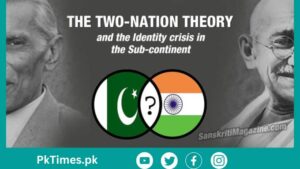Exploring the Ideology of Pakistan: The ideology of Pakistan holds a profound significance in shaping the identity and values of the nation. Rooted in a unique historical context and intellectual discourse, Pakistan’s ideology embodies the aspirations and principles that guided its creation as an independent state in 1947.
Historical Background
Pakistan’s journey as a distinct nation-state traces back to the partition of British India in 1947. The demand for a separate homeland for Muslims was articulated by visionary leaders and scholars, including Allama Iqbal, whose philosophical insights laid the groundwork for a Muslim-majority state. Allama Iqbal’s vision emphasized the spiritual and cultural distinctiveness of Muslims in the Indian subcontinent, fostering a sense of collective identity and self-determination.
Concept of Two-Nation Theory
Central to the ideology of Pakistan is the Two-Nation Theory, which posits that Hindus and Muslims in the Indian subcontinent constituted two distinct nations with divergent religious, cultural, and political aspirations. This theory, articulated by leaders such as Muhammad Ali Jinnah, advocated for the creation of a separate Muslim state to safeguard the rights and interests of the Muslim minority.

Foundational Principles of Pakistan
The ideology of Pakistan is anchored in several foundational principles that define its identity and governance:
| Foundational Principle | Description |
|---|---|
| Islamic Ideals | Islam serves as the spiritual and moral compass of Pakistan, influencing its legal and social systems, and cultural practices. |
| Democracy and Rights | Pakistan’s founders envisioned a democratic state that respects the rights and freedoms of all citizens, irrespective of religion or ethnicity. |
| Social Justice and Equality | The ideology promotes principles of social justice, equality, and tolerance, aiming to create a fair and inclusive society. |
Evolution and Challenges
Over the decades, Pakistan’s ideology has evolved in response to political, social, and economic developments. Constitutional amendments and political dynamics have shaped the interpretation and application of Pakistan’s founding principles. However, challenges such as sectarianism, extremism, and regional conflicts have tested the resilience of Pakistan’s ideological framework.
| Evolution and Challenges | Description |
|---|---|
| Constitutional Amendments | Changes in Pakistan’s constitution have influenced the interpretation and application of its founding principles. |
| Political Dynamics | Political developments and shifts have shaped the ideological landscape, impacting governance and policy decisions. |
| Societal and Economic Changes | Evolving societal norms and economic challenges have posed tests to the resilience of Pakistan’s ideological framework. |
| Sectarianism and Extremism | Challenges such as sectarianism and extremism have threatened social cohesion and tested Pakistan’s ideological unity. |
Conclusion
In conclusion, the ideology of Pakistan embodies a rich tapestry of historical legacies, philosophical insights, and national aspirations. It continues to shape the collective identity and governance of the nation, providing a guiding framework for policies and societal norms. As Pakistan navigates contemporary challenges and opportunities, a deeper understanding and appreciation of its ideology can foster unity, resilience, and progress.
The enduring relevance of Pakistan’s ideology underscores the importance of dialogue, introspection, and collective engagement in upholding its core principles of Islam, democracy, social justice, and equality. By embracing these foundational values, Pakistan can realize its potential as a vibrant and inclusive nation committed to peace, prosperity, and national harmony.
Read more: is binance legal in pakistan
FAQ’s
- What role does Islam play in the ideology of Pakistan?
- Islam serves as a foundational principle of Pakistan’s ideology, influencing its legal system, societal norms, and cultural practices. The ideology emphasizes Islamic ideals such as justice, equality, and moral integrity in governance and everyday life.
- How has Pakistan’s ideology evolved since its independence in 1947?
- Pakistan’s ideology has evolved over time in response to political, social, and economic developments. Constitutional amendments, political dynamics, and societal changes have influenced the interpretation and application of its founding principles.
- What are the challenges to Pakistan’s ideology today?
- Contemporary challenges to Pakistan’s ideology include issues such as sectarianism, extremism, regional conflicts, and socioeconomic disparities. These challenges test the resilience of Pakistan’s ideological framework and require concerted efforts to address through dialogue, inclusivity, and societal engagement.


